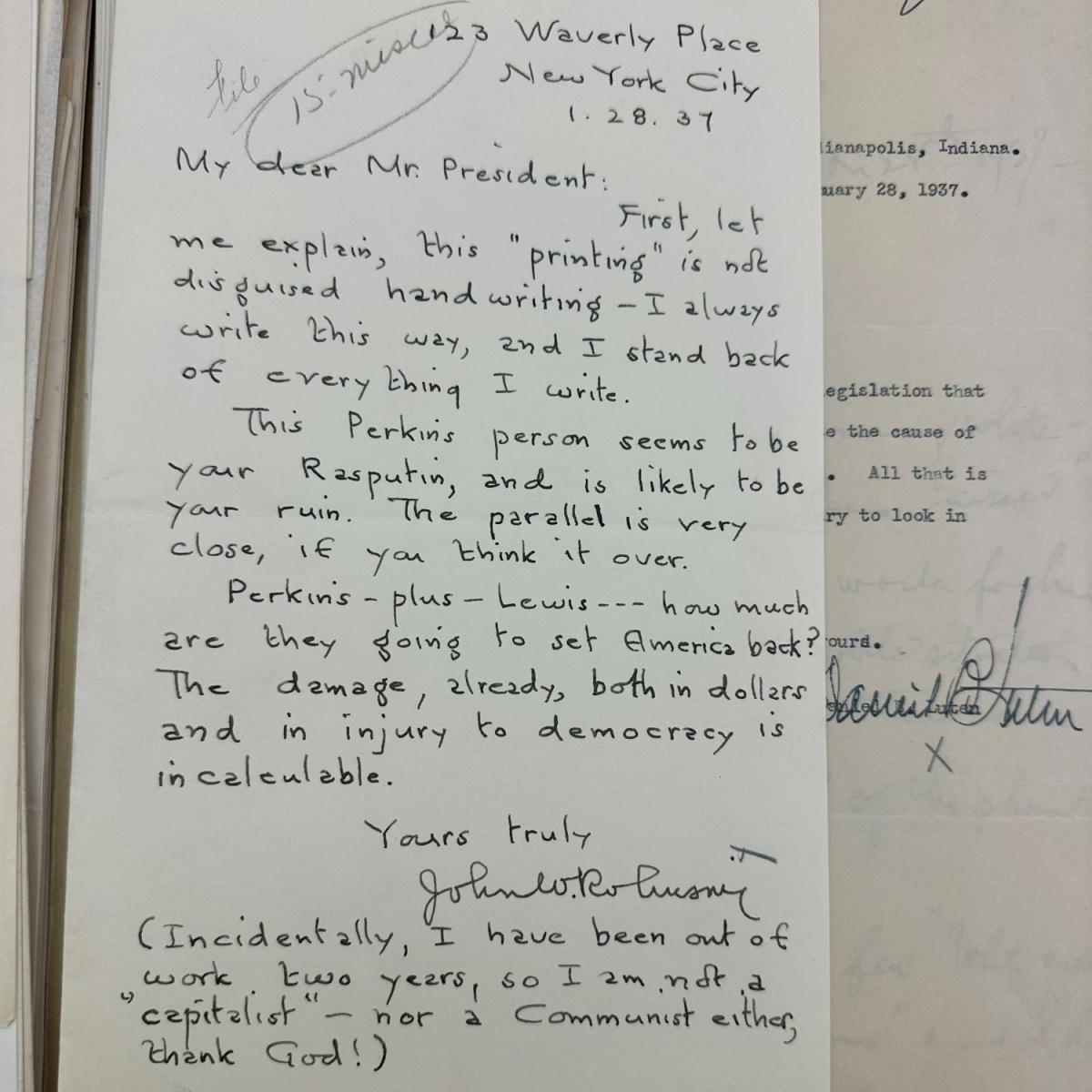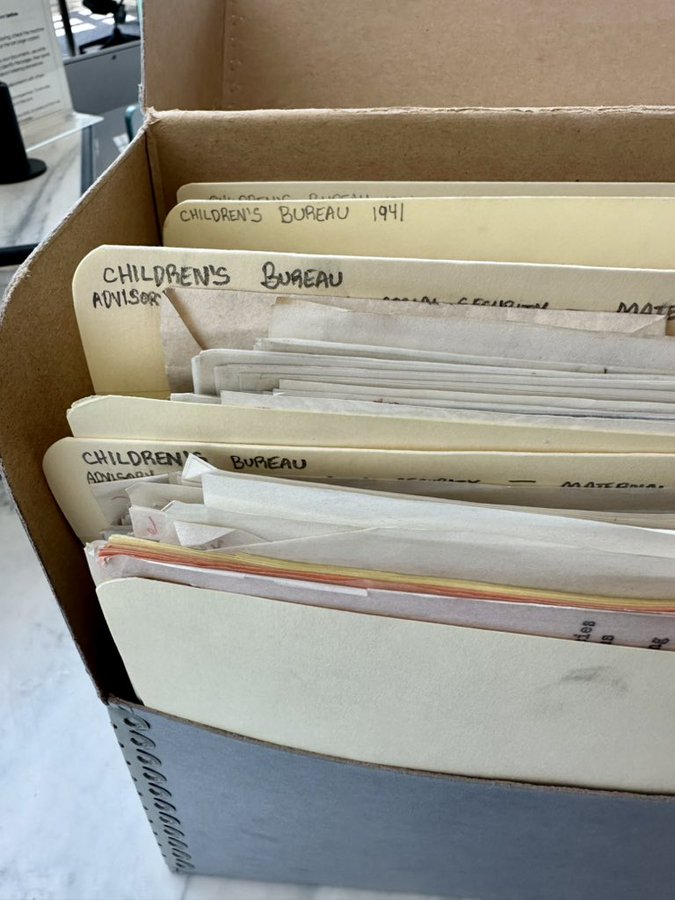
History Fellow Examines Frances Perkins’s Immigration Policy
By Angela Tudico | National Archives News
WASHINGTON, March 11, 2024 — Dr. Rebecca Brenner Graham's time as a 2023 Cokie Roberts Women's History Fellow took her from the National Archives at College Park in Maryland to the Franklin D. Roosevelt (FDR) Presidential Library in Hyde Park, New York. Graham’s research traces how Perkins, the first female Cabinet secretary and the longest serving Secretary of Labor, aided German Jewish refugees in the 1930s.
The journey to Graham’s forthcoming narrative nonfiction book, Dear Miss Perkins: A Story of Frances Perkins’s Efforts to Aid Refugees from Nazi Germany, actually started a decade ago, when the Washington, DC-based high school teacher and historian first tackled the topic for her senior thesis at Mount Holyoke College.
“There are people who think Perkins is just a fun fact or a notable ‘first,’ but there’s a real history that touches on so many broader stories in American history, that I had to return to,” Graham said. “By telling the history of Perkins’s time as head of the Department of Labor, which included the Immigration and Naturalization Service (INS) when she assumed her role, and her attempts to aid German Jewish refugees, I’m really telling several stories: the challenges and backlash Perkins faced as a woman in power, the refugee crisis caused by Hitler’s Nazi Germany, and the intra-governmental fight between the Department of Labor and Department of State over control of immigration.”
To tell this history, Graham drew heavily on the records of the National Archives. The subject files of the Secretary of Labor in the General Records of the Department of Labor proved particularly valuable in unearthing the stories of individual refugees and the extent to which Perkins assisted them.
Because strict quotas based on national origin governed U.S. immigration policy when Perkins assumed her duties as Secretary of Labor, ad hoc interventions in visa processes were some of the only options for seeking asylum. Many Americans reached out to Perkins to secure these papers on behalf of German Jewish refugees, generating the records Graham refers to as her “home documents.”
While Perkins's personal papers are held by Columbia University, the National Archives is the primary recordkeeper of Perkins’s letters to people in an official capacity, and vice versa. The title of Graham’s book, Dear Miss Perkins, refers to the letters addressed to her on behalf of German Jewish refugees seeking safe harbor in the United States.
“Without these records the book truly would not exist,” Graham said. “Also, being with her handwriting and in her papers helps me feel like I know her better. During my November school break, when I was writing my introduction and finishing my last chapter, I spent a day at College Park. I wasn’t looking for anything in particular. I was just being in her records for a sense of this person.”
Graham also looked at subject files in the Records of the Children’s Bureau, which was nested under the Department of Labor in the 1930s. Those records helped Graham understand the story of the Department of Labor’s partnership with the German Jewish Children’s Aid Group, which brought hundreds of refugee children to the United States between 1934 and 1941.
Most recently, on a trip to the FDR Presidential Library, Graham examined the hate mail FDR and Perkins received while she served as the first female Cabinet secretary.
The records do not tell the entire story, and Graham found reading the silences helpful. Some holes in the records reflect something that never existed, like Cabinet meeting transcripts. Because FDR wanted his Cabinet to speak freely, the meetings were not recorded. Other gaps tell the story and answer Graham’s basic research question: to what extent was Perkins able to assist refugees?
“If you’re not finding something, there’s a reason you’re not finding it, and that’s part of the story too. If I wasn’t finding a million examples of Perkins being able to save someone, then the story is that she couldn’t. It’s not that they’re not there. It’s literally a different answer. It’s factoring in silences to the interpretation,” Graham said. “So this is ultimately the story of Perkins learning the limits of humanitarianism at the federal level because of these broader structural forces.”
Graham is a history teacher at the Madeira School in Washington, DC, and an adjunct professorial lecturer at American University. She earned a Ph.D. in history and an M.A. in public history from American University and a B.A. in history and philosophy from Mount Holyoke College.
She is conducting her research as a 2023 recipient of the Cokie Roberts Women’s History Fellowship.
Supported by the National Archives Foundation (NAF), the fellowships are awarded to early to mid-career historians, journalists, authors, or graduate students who perform and publish new research to elevate women’s history using records held by the National Archives.
The fellowship launched in 2019 to honor noted author and journalist Cokie Roberts, who spent her career shining light on the stories of many women who had an impact on U.S. history.
“My mom understood something vital about women—they often make history, but they make it in their own way,“ said Rebecca Roberts, Cokie Roberts’ daughter and NAF board member. “Their stories are often obscured by neglect, sexism, misinterpretation, or even by the women themselves. This fellowship gives historians the resources and support they need to uncover and celebrate women’s stories.”
Read about previous Cokie Roberts Women’s History Fellows: Kara Dixon Vuic, Lois Leveen, Randa Tawil, and Jessica Kahkoska.


